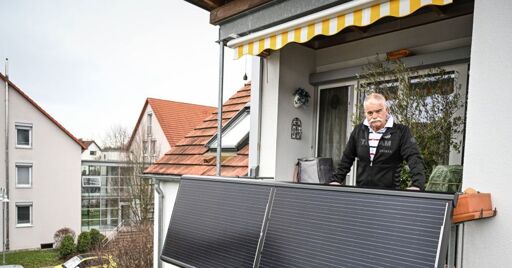Part is regulations. Utah, of all places, recently passed legislation that requires utilities to allow small solar systems to plug into home systems without an application or fee from the utility.
Where I live, you can buy solar, but the energy isn’t yours. You can’t install a battery and the energy generated only gets you a discount, but never gets you below zero. Essentially you’re buying the energy company some equipment for a discount on your bill.
@P00ptart That’s shitty
The other part is lack of tenant rights. Which Utah will not be a leader on anytime soon. Our leases have half page long restrictions on what can and can’t be on your balcony and the legislature isn’t about to back up renters.
It took me a while to reply to this. I thought it was a really good comment though.
I didn’t think about landlords doing their usual douchey thing. But of course this is going to happen because anything that disturbs some apartment owners arbitrary aesthetic vision is going to be banned easily.
I read the legislation. it’s only five pages. It is really biased for single home owners without being explicit about that.
I think I did the estimate correctly, under typical sunny Utah conditions you would only make about a dollar worth of electricity a day at current rates with the maximum allowed system.
Up to 1.2kW hopefully.
Yes, 1.2kWac. Did I do the estimate correctly? My quick estimate of the power yield under Utah conditions is anywhere between a dollar and $1.50 a day? Does that seem to be in the ballpark?
Why dont they just lease them to people and be paid by the electricity generated. Then when its paid off the owner gets the profits.
Get out of here with your ‘logic’.
Wondering, wouldn’t the power generated appear as a reduction of power used on the tenants bill? Meaning the tenant would need to pay the leasing company and tenants are less likely to do that?
Having the power company so this would make perfect sense in that scenario.
“I don’t understand why people won’t pay outrageous prices for something that can only charge a laptop during an economic collapse”
Lol. The article is underselling them a bit. 800W does a bit more than that.
Btw. prices have become pretty low. So it’s worth it if you have the space. Not sure what you mean with economic collapse, though.
I’m an engineer that worked in solar for a bit. You will not get 800w out of vertical panels on your balcony.
This is why I have 2 kWp, on the roof. Suboptimal orientation, some afternoon shading so only 4.5 kWh/day longterm average.
Vertical is good for the winter. Vertical free standing bifacials are surprisingly good year over, because of better convection cooling and reflection, especially from snow or water.
It depends on the balcony. I could get that on mine pretty easily, but it would mean basically closing the entire thing off.
Yep probably closer to 200w which is still pretty good for a room without air conditioning.
They’re heavily tariffed at the moment.
Not sure what I mean by economic collapse?
You’re making a joke, right?
These systems dont keep the lights on when the grid is down. That may not be what you’re insinuating, but it is a common misconception.
They offload some of your electrical usage to a free source to lower your bill and help the environment. Its not a replacement for grid electricity. Its a supplement. Since it seems like whoever you were replying to thought these were supposed to power your whole house.
No body thinks these power your house.
You clearly did.
Quote me or fuck off 💋
I’m not insinuating anything. I’m suggesting they cost a lot and the power they give is not worth the investment. If they were significantly lower and cost or significantly higher in power, regardless of being able to fully power your home, then they might be a better solution.
But you were commenting on my comment of economic collapse which is laughing at the person who suggested that nothing’s wrong. So, they are eithernot paying attention to anything or dumb as fuck
They pay for themselves in two years or less. Legal 800 W feed-in limited still allow for 2 kWp total module power and increasingly there are buffer batteries.
I think the people replying to you aren’t properly parsing your comment. To rephrase it for these folks:
“I don’t understand why -during an economic collapse- people won’t pay outrageous prices for something that can… charge a laptop”
I.e., it shouldn’t be surprising that people aren’t going to spend a bunch of money on something nearly useless when our economy is actively collapsing
Haha thank you.
Balkonkraftwerk makes zero power when the grid is down.
I still don’t understand these. Like I would think you need a batter system that could handle the grid to begin with.
They inject power into your local single phase circuit, with surplus escaping into the grid. Where it gets no farther than to the next consumer. There are kits with few kWh buffer battery which can aim for zero feed in if you’re not feeling altruistic.
I thought you could not send power into the grid without a setup to shutdown in case someone is working on the grid or something like that.
The solar inverter shuts down in milliseconds if it detects that mains power is gone. The reason for it is the one you cited.
This behaviour can be changed with a different firmware.
ooh nice. you know I have seen many articles on there and they talk about just needing any old plug but I just could not see it. Sounds like it is a real possibility.
In Germany, which has very strict regulations, there was some discussion and now small balcony solar systems can feed back into the grid, turning the meter backwards. One has to register it and in theory the utility company will install a smart meter, but often, the latter does not happen (and the former is rarely controlled). (And for safety, the panels and inverters will switch off if the grid is down.)
Most but the oldest mechanical meters cannot run backwards. Whatever you don’t consume is gifted to the grid.
Power station vendors have a solution for US. Smart plugs that never backflow to grid. US utility monopolies hate solar, but the most friendly solar regulation possible is low fixed monthly fees for low amp inflow cap (with high per kwh rates), or permission for homes to be off grid.
Even with forced grid connections, there is a ROI case for self consumption only solar that requires no grid permissions for no grid sell back/credits. Powerstations are a fairly easy method, for portable power that can be rearranged in home, including DC power efficiency benefits. Multiple power stations can deal with shading and multiple panel orientations, can deal with power outages, and provide emergency power in rooms where needed or fully mobile power. EVs can ensure you never have too much power stored, and while TOU rates still favour overnight charging, even (morning) kitchen needs can be shifted to solar or minimal/optimal grid charging.
Tariffs are a big obstacle for US now, but rest of Americas has similar grid. If consumers get extorted from data center demand preference, it is further reason to seek escape.






